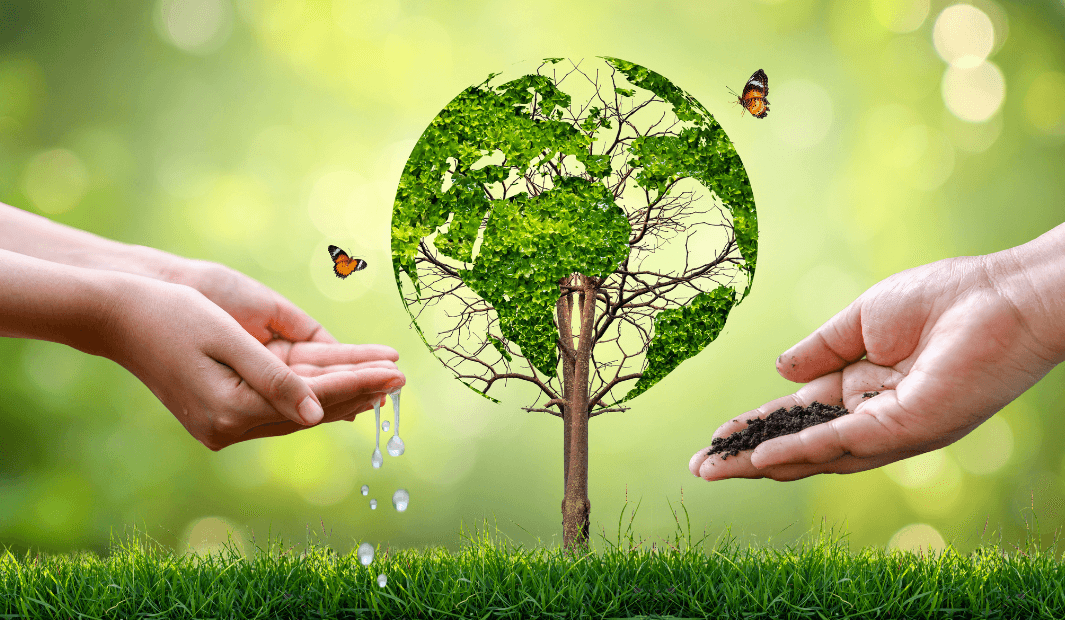50 interesting English speech topics on environment
Last Updated At: 4 Aug 2025
12 min read

Table of Contents
- How to Choose the Right Speech Topic on Environment
- Why Giving English Speeches Is Crucial for a Child’s Growth
- How Early Public Speaking Affects a Child’s Personality and
- How Environment Speeches Build Awareness and Action
- Tips for Writing an Effective English Speech on Environment
- Common Challenges Children Face While Preparing Environmenta
- How PlanetSpark Builds Confidence in Environmental Speeches
- Conclusion
- Readers Also Read
- FAQs
In today’s world, speaking up for the environment is more important than ever. Children who learn to talk about nature, pollution, or climate change not only build their speaking skills but also grow into responsible, aware citizens. Choosing the right topic can make all the difference in how confidently a child presents their speech.
This blog brings you 50 interesting English speech topics on environment that are engaging, age-appropriate, and perfect for school competitions or classroom practice. PlanetSpark encourages this growth by nurturing strong communication skills in children from an early age.
50 Interesting English Speech Topics on Environment
1. Climate Change & Global Warming
- How Climate Change Is Affecting Our Planet
- What Kids Can Do to Fight Global Warming
- Melting Glaciers: A Warning to Us All
- Why Earth’s Temperature Is Rising
- Climate Action Starts With Me
- How Weather Patterns Are Changing
- Greenhouse Gases and Their Impact
- The Role of Trees in Fighting Climate Change
- How Sea Levels Are Rising and Why It Matters
- COP Summits and What Kids Should Know
2. Pollution & Waste Management
- Say No to Plastic: A Speech for Everyday Change
- How Air Pollution Affects Our Health
- The Dirty Truth About Water Pollution
- Waste Segregation: Why Every Home Should Do It
- The Importance of Clean Rivers
- How Noise Pollution Impacts Our Lives
- Simple Ways to Reduce Household Waste
- What Is E-Waste and Why It’s Dangerous
- Recycling Is Not a Choice, It’s a Habit
- A Day Without Pollution: Can We Imagine It?

Speech topics are just the beginning. Book a session and unlock your child's voice and vision.
3. Nature & Wildlife Conservation
- Why We Must Save Endangered Species
- The Role of National Parks in Wildlife Protection
- Forests Are the Lungs of Earth
- Protecting Marine Life: What We Can Do
- Why Bees Matter More Than We Think
- Deforestation and Its Harmful Effects
- Let’s Protect Our Natural Resources
- The Importance of Biodiversity
- Zoos vs. Natural Habitats: A Debate
- Saving the Tiger: India’s Pride
4. Sustainable Living & Green Habits
- What Is a Green Lifestyle?
- Why We Should All Use Public Transport
- Conserving Water at Home and School
- Solar Energy: Powering the Future
- Composting: Turning Waste into Gold
- How to Create a Plastic-Free Lunchbox
- Planting a Tree: A Simple Yet Powerful Act
- The 3 Rs: Reduce, Reuse, Recycle
- Why Every School Should Have a Garden
- Green Homes for a Better Tomorrow
5. Innovative Solutions & Environmental Heroes
- Greta Thunberg: A Teen Voice for Climate
- How Technology Can Help the Environment
- Electric Vehicles: The Road Ahead
- Smart Cities and Clean Energy
- Rainwater Harvesting: Old Wisdom for Modern Times
- Solar Cookers and Eco-Innovation
- Environmental Startups Making a Difference
- Youth Activists Who Are Changing the World
- How Art and Music Can Inspire Climate Action
- Becoming an Eco-Champion: My Pledge
How to Choose the Right Speech Topic on Environment
Selecting the right English speech topic on environment can make your child’s speech journey smoother and more enjoyable. Here are some tips to help you make the best choice:
Pick a topic your child is genuinely curious about. Children speak better when they feel connected to the subject.
- Match the topic to your child’s age and understanding level. Simpler topics work better for younger kids, while older children can handle more complex ideas like climate change or sustainable innovation.
- Choose an environmental speech topic that allows personal opinions. This helps children express themselves more naturally and makes the speech more engaging.
- Look for topics with real-life examples or action steps. Practical, relatable topics help kids connect better with their audience.
- Incorporate current environmental issues and solutions. Topics about pollution, wildlife conservation, or green energy are not only timely but also educational.
- Encourage topics that spark action. Themes like "Planting Trees in My Neighbourhood" or "How I Reduced Plastic Use at Home" turn ideas into impact.
By choosing the right English speech topic on environment, you’re giving your child a powerful platform to build communication skills and raise awareness.

Turn ideas into powerful speeches. Join PlanetSpark and help your child become a persuasive speaker.
Book a Free Demo Now!
Why Giving English Speeches Is Crucial for a Child’s Growth
Helping children give English speeches on environment topics can play a vital role in their personal and academic development. When a child prepares a speech on an environmental issue, they are not only learning about the planet but also developing essential life skills that will stay with them forever.
Public speaking gives children the chance to think critically, organise their ideas, and present them with clarity and confidence. Topics like saving trees, reducing plastic, or protecting endangered species provide real-world relevance. Children become more aware of the world around them and start forming opinions and ideas about how they can make a difference. This sense of purpose builds character and strengthens communication.
Learning to speak on stage or in front of a group teaches children to overcome fear and manage their emotions. It helps them speak clearly, listen attentively, and express their ideas respectfully. These are the same skills that benefit them in classrooms, interviews, group discussions, and even future careers.
When children explore English speech topics on environment, they also improve their vocabulary and sentence construction. They learn how to research facts, use examples, and add emotion to their words. All of this boosts both academic performance and personality development.
Giving speeches at an early age encourages children to stand up for what they believe in, speak with confidence, and lead by example. It builds a strong foundation for success in school and beyond.
How Early Public Speaking Affects a Child’s Personality and Future
Children who begin public speaking early in life tend to show a noticeable difference in their communication abilities and self-confidence when compared to those who do not. The habit of preparing and delivering speeches helps shape key aspects of a child’s personality.
Below is a comparison of children who practice speaking early versus those who avoid it:
| Children Who Give Speeches Early | Children Who Avoid Public Speaking |
|---|---|
| Speak clearly and confidently in any setting | Often stay quiet in group settings |
| Handle school interviews, events, and group tasks with ease | May struggle with class participation |
| Are active listeners and respectful communicators | May interrupt or avoid conversations |
| Display leadership traits early in school life | Prefer to remain unnoticed in group tasks |
| Have better vocabulary and writing skills | Often find it hard to express thoughts in writing |
| Enjoy learning new topics and sharing ideas | May find new topics overwhelming |
| Develop emotional strength and stage presence | May experience fear or anxiety in public |
Early exposure to English speeches on environment topics trains children to communicate thoughtfully, care about global issues, and become future-ready. These children not only do better in school but also grow up to be responsible, confident, and articulate individuals.
If you want to give your child a head start, encourage them to speak about what matters. Start with familiar topics like nature and the environment, and build from there.
How Environment Speeches Build Awareness and Action
When children speak on environmental topics, they not only learn but also become agents of change. Preparing a speech on climate change, deforestation, or plastic pollution helps kids understand global challenges from a young age. But more importantly, it inspires them to take small but meaningful steps in daily life.
Kids who talk about environmental issues are more likely to:
- Recycle at home or school
- Avoid using single-use plastics
- Save water and electricity
- Encourage their friends to plant trees or clean up parks
This shift from passive learning to active involvement empowers children to be thoughtful and responsible. Through simple English speech topics on environment, we can raise a generation that cares deeply about the planet and is ready to act.
Help your child speak up for nature. Try a free trial class and watch them own the stage.
Tips for Writing an Effective English Speech on Environment
Writing a good speech begins with a clear idea and grows through structure, personal voice, and emotional impact. Whether your child is preparing for a school event or a public speaking competition, these tips will help them craft a speech that connects with the audience and leaves a lasting impression.
1. Start with a Strong Opening
Begin with a question, fact, or short story to capture attention. For example:
“Did you know one plastic bottle can take 450 years to decompose?”
This creates curiosity and sets the tone for the topic.
2. Stick to One Main Message
Help your child choose one clear idea such as saving water or protecting forests. A focused speech is easier to understand and more powerful to deliver.
3. Add Personal Feelings or Experiences
Let them share what they truly feel or actions they have taken like using a metal water bottle or planting a sapling. Personal touches make the speech more engaging and relatable.
4. Use Simple Words and Short Sentences
Encourage the use of everyday language. The audience, especially peers, will understand and enjoy the speech more if it is easy to follow.
5. Organise with a Clear Structure
Guide them to structure their speech in this order:
Introduction (what they are going to talk about)
Problem (why the topic is important)
Solution (what can be done)
Conclusion (a strong closing line or call to action)
6. Include Facts and Examples
Real-life facts, statistics, or examples make the speech more informative and convincing. These details also help children sound knowledgeable and prepared.
7. Practice with Voice and Body Language
Practice speaking aloud with proper tone, volume, pauses, and gestures. A confident delivery enhances the message and keeps the audience engaged.
Helping your child prepare speeches on environmental topics supports not only their language development but also their understanding of the world around them. The more they speak, the more they grow into confident, thoughtful communicators.
Common Challenges Children Face While Preparing Environmental Speeches
Children often feel excited about English speech topics on environment, but that excitement can turn into anxiety without the right support. Here are some of the most common obstacles and how to help overcome them.
| Challenge | Why It Happens | How to Overcome It |
|---|---|---|
| Lack of Confidence | They feel unsure about their voice or ideas being "good enough." | Encourage practice in front of family or the mirror. Praise their effort, not just results. |
| Limited Vocabulary | Young learners may struggle to find the right words to describe environmental issues. | Help them create a “word bank” with simple terms related to nature, pollution, and sustainability. |
| Fear of Judgement | Children often worry about being laughed at or making mistakes. | Remind them everyone starts somewhere and making mistakes is part of learning. Positive peer practice helps. |
| Struggling with Structure | They might not know how to organise their thoughts. | Use a simple format: Introduction – Problem – Solution – Conclusion. Encourage storytelling. |
| Lack of Real-Life Connection | If the topic feels too abstract, they lose interest. | Help them connect it to their daily life: saving water at home, planting trees, avoiding plastic. |

How PlanetSpark Builds Confidence in Environmental Speeches
PlanetSpark’s Public Speaking Program helps children express their thoughts clearly on topics like English speech topics on environment. With expert coaching and real-world practice, kids gain the tools they need to speak with confidence.
Key Highlights:
Personalised 1:1 Coaching
Certified communication coaches guide each child based on their unique strengths and goals.
Structured Skill Building
Children learn body language, voice control, speech structure, storytelling, debating, and persuasive speaking.
TED-Style Techniques
Kids follow the hook-message-story-call-to-action model to deliver powerful and clear speeches.
Live Practice with Global Peers
Students participate in storytelling, panel discussions, and debates with peers from 13+ countries.
Competitions and Feedback
Regular contests and video-based reviews help children grow through practice and expert insights.
Conclusion
Helping your child explore English speech topics on environment is a great way to boost their confidence, communication, and sense of responsibility. From climate change to clean energy, these topics inspire children to think deeply and speak clearly.
With the right topic, practice, and guidance, every child can become a powerful speaker who not only performs well in school but also influences positive change in the world.
Want to take the next step in your child’s communication journey? Start early, stay consistent, and explore platforms like PlanetSpark that make learning public speaking fun, structured, and impactful.
Readers Also Read
✅ Speak and Improve English – Boost Fluency with Real Practice
Explore how your child can enhance fluency, vocabulary, and pronunciation through expert-led spoken English training.
✅ Develop Confidence in Public Speaking for Kids
Learn how structured public speaking programs help children overcome stage fright and express their ideas with clarity.
FAQs
Q1. What are some good English speech topics on the environment for kids?
Topics like "Save Water, Save Life," "Why Trees Are Important," or "My Role in Protecting Nature" are simple, engaging, and age-appropriate for kids.
Q2. How can I help my child write a speech on an environmental topic?
Start with a clear outline. Introduce the topic, explain why it's important, share examples or personal stories, and end with a strong message. Keep the language simple and positive.
Q3. Why should kids give speeches on environment-related topics?
It builds awareness, confidence, and responsibility. Kids learn to think critically and speak about issues that matter to their future.
Q4. What is the ideal speech length for children?
For younger children, 1 to 2 minutes is enough. Older kids can aim for 3 to 5 minutes depending on their comfort and the topic.
Q5. How can public speaking impact a child’s future?
Public speaking improves communication, leadership, and self-confidence. These are essential skills for success in academics and life.
Personalized Communication Report
Record a video to get a AI generated personalized communication report for your child
Select Learner's Class

Hi There, want to try these
tips for your child with
LIVE with our expert coach?
Let's check your child's
English fluency
